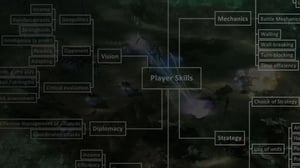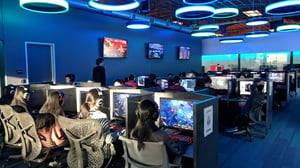
Systems Designer
TABLE OF CONTENTS
What does a systems designer do?
A system designer is the creator of the software systems that will power a video game. They are brought in early in the development process to analyze the scope and design of the game to set up the platforms that will bring the game to life.
Based on the genre and mechanics of the game the System Designer will assist in establishing the development of the project. They will assemble the suite of technical resources that the game requires, and identify any custom software that needs to be scripted for the game.
System Designers will identify which elements of the game require artificial intelligence (AI), fighting features, scoring rules, etc. They must also manage the system performance of the game, ensuring it has the power to deal with rapid gameplay and the demands that the players place on the game to make for compelling gameplay.
The prototyping process at the start of game development and the quality assurance process at the end of development are overseen by the System Designers. The prototype will test the concept of the game, inform how the game should be developed and alert to any issues that may arise during development. The QA process will test the game in its later iterations and inform of the glitches that need to be ironed out before the game heads to distribution.
Systems designer job description
System Designers take on a role similar to a computer hardware engineer, yet their role can also be strong on creativity and problem-solving duties. They may be required to track character progression from concept to implementation, defining crafting elements, skill trees and level tables.
Role & responsibilities of a systems designer in the gaming industry:
- Research and analyze resources available in the market
- Assemble all software and hardware required
- Data entry and management of game database assets
- Produce prototypes, oversee testing and implement changes
- Create customized software
- Iterate, polish and balance player progression and experience
- Tuning and balance of game data
- Oversee quality assurance process and implement changes

How much does a systems designer make?
The median salary for a senior level System Designer is around USD $94,00.
*Source Payscale
To learn more about this field, visit: The Game Development Process: How Video Games are Made
Skills required to become a systems designer for games
Apart from computer and software platform expertise, the System Designer will need to specialize in a number of skills that are specific to game development.
Video game studios may look for the following skills in systems designers:
- Strong critical and analytical thinking
- Expert knowledge of gaming software and hardware
- Adept at problem-solving
- Advanced communication skills
- Team leadership experience
- Knowledge of gameplay scripting
- Strong understanding of stat curves, player progression systems, and game play loops
- Ability to identify, break down, and define core mechanics
- Knowledge of game production pipeline and 3D game engines
What software and tools do systems designers use?
System Designers should have a solid knowledge of 3D animation, illustration and programming languages. They will need to assemble the software and hardware requirements for the duration of the game development process. Some customized software may need to be developed for the purposes of the game. The System Designer will need to factor in the resources for software development within the production process.
Systems designers may need knowledge of a combination of the following software and programming languages:
- C
- C++

Maya is a comprehensive 3D animation software used for creating detailed models, animations, and visual effects. It's popular in film, TV, and game development for its powerful tools.

3ds Max is a professional 3D computer graphics program for making 3D animations, models, games and images. It is developed and produced by Autodesk Media and Entertainment.

Unreal Engine is a 3D computer graphics game engine developed by Epic Games, first showcased in the 1998 first-person shooter video game Unreal

Substance Painter: The tools you need to texture your 3D assets, from advanced brushes to Smart Materials.

Adobe Photoshop is a raster graphics editor developed and published by Adobe for Windows and macOS. It was created in 1987 by Thomas and John Knoll

Unity is a cross-platform game engine developed by Unity Technologies, first announced and released in June 2005 at Apple Worldwide Developers Conference
How to become a systems designer
Here are some sure-fire strategies to help increase your chances of getting a job in game design.
Get the skills
Look at game studio job ads to see the skills they’re hiring for. Then build those skills: download and learn relevant software, watch online tutorials, or enroll in an industry-focused course.
Stay ahead of trends
Seek out online tutorials, webinars, conferences, publications, and other game programming content to remain informed. See our resource section.
Create your own games
A great way to understand the rigors of game dev and showcase your talent and basic grasp of game production for potential recruiters.
Participate in game jams
A team challenge to produce a game in 24–72 hours, with participants taking on various roles. Gain experience, collaborate, and work towards a deadline. Use the final product in your reel.
Engage with communities
Building connections is vital to getting your name and skills recognized, and a chance to interact with industry pros who can offer advice or even jobs.
Intern at a game studio
Not always a viable option, but it can be a great way of gaining hands-on experience while also networking.

Ready to Start Your Film & Games Journey?
Download our course guide to see how we can help you on your pathway to your dream career.Tips to break into the systems design industry
Use the networking opportunities available to programmers and game devs to build up your contacts. This can be one of the best ways to get a job. Searching online, you can find many industry meetups and events, which often include guest speakers like professional artists and software creators. The knowledge gained by listening to these types of guest speakers talk about their personal experiences is irreplaceable.
Don't for get to check out our interview with Ubisoft AI programmer Firas Hosn.
Get a QA job
Kick-start your career with a job in Quality Assurance. Expand your gaming knowledge by testing and pushing in-production games to their limits.
Collaborate with peers
Working with your peers is fun, you can learn from each other and tackle bigger projects.



